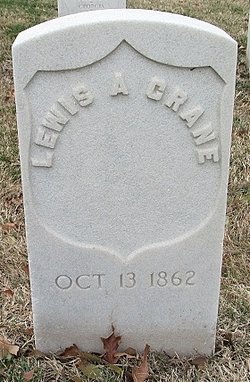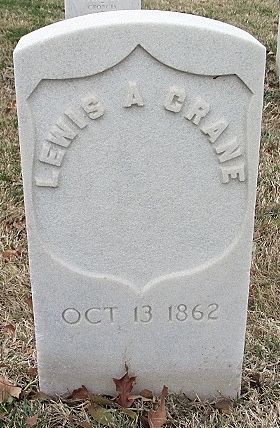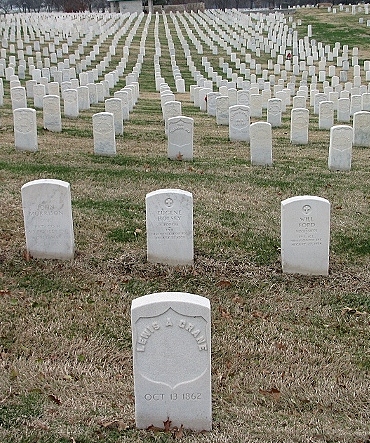When the Civil War broke out, Lewis and his father Martin decided to joined the Union in fear of the Rebels killing them or being made to join them. Lewis and Martin joined the 1st Battalion, Arkansas Infantry for six months. During their time in camp they became very ill and along with their regiment was sent to Benton barracks in St. Louis. Lewis was to succumb to his illness on Oct. 13, 1862, he was twenty years old. Martin survived his illness and was returned to duty from the hospital November 22, 1862.
Lewis younger brother Erasmus enlisted into the Union Army as a private in Company H, 3rd Cavalry Regiment Arkansas on February 1, 1864 and he mustered out June 30, 1865
*****************************************
From the Report of the Adjutant General of the State of Arkansas
by Albert W. Bishop, Adjutant General of Arkansas, 1867
A few days after the arrival of the federal army in Batesville, in the spring of 1862, H.V. Gray, a loyalist from Black River township, in Independence County, with about forty of his neighbors, who, with others to the number of one hundred or upwards, had previously banded themselves together to resist, by force, if need be, attempts to urge them into the rebel service, made their appearance at the headquarters of General Curtis, and tendered their services to the government. Capt. Gray requested permission to recruit for a regiment of six-months men. A few months previous to this he came near losing his life at the hands of a mob, but a short distance from where headquarters then were, for saying that if he did any fighting during the contest it would be under the stars and stripes. This circumstance, with others showing the determined bravery and persistent loyalty of himself and associates so challenged the respect and admiration of the commanding general that he complied with the request, notwithstanding he then had no authority from the War Department to recruit six-months men. Afterwards authority was given to Pleasant Turney, of Independence and L. D.Toney, of Izard County to recruit. In June Thomas S. Williams and George Gallaway came into the lines from Conway County, each with about thirty men. They had organized some time previously, in like manner with the people of Black River township, for self defense, and were compelled to flee to the army, be killed, or go into the rebel service. Men recruited under the authority referred to, residing within the lines, remained at home until the last of June, no authority having been given for their muster in.
On the last day of June, very unexpectedly to the people, General Curtis moved down White River. These recruits, with many other persons obnoxious to those in rebellion, left with the army, and so sudden and unexpected was the leaving, that men about their daily avocations, a short distance from home, on learning that the army was in motion, left without returning to say farewell to their families or procure a change of clothing. All believed the country was to be held, and that they were not again to be subjected to rebel violence and oppression. In this they were mistaken.
On the arrival of the army at Helena, these recruits, with others who had been compelled to leave their homes, were mustered and organized into a battalion of infantry, of which J. C. Bundy was appointed lieutenant colonel. They had expected to be permitted to mount themselves and for this purpose,, on leaving, as well as to prevent their rebel neighbors from getting them, had taken their horses. This they were denied and being allowed neither to forage upon the country or draw forage from the quartermaster's department, some of their animals died, and the remainder were sold for a trifle or given away. Anxiety concerning their families, who were suffering every indignity at the hands of their enemies, and could be heard from only after uncertain and long intervals; inactivity in camp, loss of property, and disappointment in not seeing their State seized and held by the strong arm of military power, so aggravated diseases prevailing in camp that in October there were not sufficient men in health for camp duty. In this condition they were ordered to St. Louis, and sent to Benton barracks, where they remained until their muster out on the 31st day of December, 1862. During the six months nearly one hundred and fifty died from disease, to including Captains Gray and Turney and Lieut. Clark.
It is worthy of note that this battalion was composed mostly of men who had banded themselves together to resist the cause of treason before federal troops entered the State.
"Very truly, your obedient servant
C.C. Bliss"
The above information was transcribed from the microfilm copies of the service records and may be used for non-commercial historical and genealogical purposes and may be copied for the same purposes so long as this notice remains a part of the copied material.
When the Civil War broke out, Lewis and his father Martin decided to joined the Union in fear of the Rebels killing them or being made to join them. Lewis and Martin joined the 1st Battalion, Arkansas Infantry for six months. During their time in camp they became very ill and along with their regiment was sent to Benton barracks in St. Louis. Lewis was to succumb to his illness on Oct. 13, 1862, he was twenty years old. Martin survived his illness and was returned to duty from the hospital November 22, 1862.
Lewis younger brother Erasmus enlisted into the Union Army as a private in Company H, 3rd Cavalry Regiment Arkansas on February 1, 1864 and he mustered out June 30, 1865
*****************************************
From the Report of the Adjutant General of the State of Arkansas
by Albert W. Bishop, Adjutant General of Arkansas, 1867
A few days after the arrival of the federal army in Batesville, in the spring of 1862, H.V. Gray, a loyalist from Black River township, in Independence County, with about forty of his neighbors, who, with others to the number of one hundred or upwards, had previously banded themselves together to resist, by force, if need be, attempts to urge them into the rebel service, made their appearance at the headquarters of General Curtis, and tendered their services to the government. Capt. Gray requested permission to recruit for a regiment of six-months men. A few months previous to this he came near losing his life at the hands of a mob, but a short distance from where headquarters then were, for saying that if he did any fighting during the contest it would be under the stars and stripes. This circumstance, with others showing the determined bravery and persistent loyalty of himself and associates so challenged the respect and admiration of the commanding general that he complied with the request, notwithstanding he then had no authority from the War Department to recruit six-months men. Afterwards authority was given to Pleasant Turney, of Independence and L. D.Toney, of Izard County to recruit. In June Thomas S. Williams and George Gallaway came into the lines from Conway County, each with about thirty men. They had organized some time previously, in like manner with the people of Black River township, for self defense, and were compelled to flee to the army, be killed, or go into the rebel service. Men recruited under the authority referred to, residing within the lines, remained at home until the last of June, no authority having been given for their muster in.
On the last day of June, very unexpectedly to the people, General Curtis moved down White River. These recruits, with many other persons obnoxious to those in rebellion, left with the army, and so sudden and unexpected was the leaving, that men about their daily avocations, a short distance from home, on learning that the army was in motion, left without returning to say farewell to their families or procure a change of clothing. All believed the country was to be held, and that they were not again to be subjected to rebel violence and oppression. In this they were mistaken.
On the arrival of the army at Helena, these recruits, with others who had been compelled to leave their homes, were mustered and organized into a battalion of infantry, of which J. C. Bundy was appointed lieutenant colonel. They had expected to be permitted to mount themselves and for this purpose,, on leaving, as well as to prevent their rebel neighbors from getting them, had taken their horses. This they were denied and being allowed neither to forage upon the country or draw forage from the quartermaster's department, some of their animals died, and the remainder were sold for a trifle or given away. Anxiety concerning their families, who were suffering every indignity at the hands of their enemies, and could be heard from only after uncertain and long intervals; inactivity in camp, loss of property, and disappointment in not seeing their State seized and held by the strong arm of military power, so aggravated diseases prevailing in camp that in October there were not sufficient men in health for camp duty. In this condition they were ordered to St. Louis, and sent to Benton barracks, where they remained until their muster out on the 31st day of December, 1862. During the six months nearly one hundred and fifty died from disease, to including Captains Gray and Turney and Lieut. Clark.
It is worthy of note that this battalion was composed mostly of men who had banded themselves together to resist the cause of treason before federal troops entered the State.
"Very truly, your obedient servant
C.C. Bliss"
The above information was transcribed from the microfilm copies of the service records and may be used for non-commercial historical and genealogical purposes and may be copied for the same purposes so long as this notice remains a part of the copied material.
Gravesite Details
US Army Civil War
Family Members
Advertisement
Explore more
Sponsored by Ancestry
Advertisement





